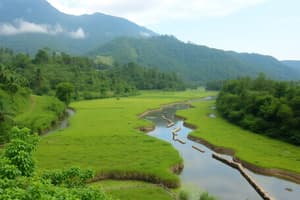Podcast
Questions and Answers
Ecosystems in dynamic equilibrium can last a long time and are sustainable.
Ecosystems in dynamic equilibrium can last a long time and are sustainable.
True (A)
Soil erosion can be minimized by leaving soil barren during certain times.
Soil erosion can be minimized by leaving soil barren during certain times.
False (B)
Aquaponics involves growing plants in soil with the help of fish.
Aquaponics involves growing plants in soil with the help of fish.
False (B)
Crop rotation is an effective method to increase soil fertility.
Crop rotation is an effective method to increase soil fertility.
The concept of Mother Earth as a living person suggests she must be treated with respect to ensure future sustainability.
The concept of Mother Earth as a living person suggests she must be treated with respect to ensure future sustainability.
Hydroponics is a form of agriculture that uses soil to grow plants.
Hydroponics is a form of agriculture that uses soil to grow plants.
Better water management includes utilizing crops that can adapt to local weather conditions.
Better water management includes utilizing crops that can adapt to local weather conditions.
Traditional knowledge asserts that all life-sustaining activities must occur without regard to seasons.
Traditional knowledge asserts that all life-sustaining activities must occur without regard to seasons.
Agriculture has replaced more than 40% of the Earth's surface that was once covered by forests.
Agriculture has replaced more than 40% of the Earth's surface that was once covered by forests.
Deforestation does not contribute to climate change as it reduces the number of trees that can absorb CO2.
Deforestation does not contribute to climate change as it reduces the number of trees that can absorb CO2.
Overpopulation leads to increased clear-cutting of forests due to the demand for more land.
Overpopulation leads to increased clear-cutting of forests due to the demand for more land.
Plastic production has no impact on ocean ecosystems.
Plastic production has no impact on ocean ecosystems.
Carbon dioxide emissions contribute to extreme weather events such as heatwaves and floods.
Carbon dioxide emissions contribute to extreme weather events such as heatwaves and floods.
Coral reefs are not affected by human activities such as pollution and overfishing.
Coral reefs are not affected by human activities such as pollution and overfishing.
Intensive agriculture can lead to the depletion of critical freshwater aquifers.
Intensive agriculture can lead to the depletion of critical freshwater aquifers.
Invasive species rarely disrupt native food chains because they usually have natural predators.
Invasive species rarely disrupt native food chains because they usually have natural predators.
Flashcards
Dynamic Equilibrium
Dynamic Equilibrium
A state where an ecosystem is balanced and sustainable over long periods, with minimal changes.
Sustainable Agriculture Practices
Sustainable Agriculture Practices
Practices that aim to minimize reliance on chemical pesticides in agriculture, focusing on natural methods like introducing predator insects or crop rotation.
Permaculture
Permaculture
Planting different crops in the same area, mimicking a natural ecosystem's diversity, promoting healthier soil and pest resistance.
Hydroponics/Aquaponics
Hydroponics/Aquaponics
Signup and view all the flashcards
Aboriginal Sustainability Concepts
Aboriginal Sustainability Concepts
Signup and view all the flashcards
Agroforestry
Agroforestry
Signup and view all the flashcards
Urban Agriculture
Urban Agriculture
Signup and view all the flashcards
Cover Crops
Cover Crops
Signup and view all the flashcards
Deforestation
Deforestation
Signup and view all the flashcards
Fertilizer Use in Agriculture
Fertilizer Use in Agriculture
Signup and view all the flashcards
Overconsumption
Overconsumption
Signup and view all the flashcards
Plastic and Chemical Pollution
Plastic and Chemical Pollution
Signup and view all the flashcards
Greenhouse Gas Emissions
Greenhouse Gas Emissions
Signup and view all the flashcards
Coral Reef Destruction
Coral Reef Destruction
Signup and view all the flashcards
Aquifer Depletion
Aquifer Depletion
Signup and view all the flashcards
Overhunting and Overexploitation
Overhunting and Overexploitation
Signup and view all the flashcards
Study Notes
Human Activities Affecting Ecosystems
- Agriculture: More than 40% of Earth's surface is used for agriculture, replacing forests. Fertilizers harm soil, land, and water systems.
- Deforestation: Destroys wildlife, contributes to climate change by reducing CO2 absorption. Almost half of the world's trees have been lost since the Industrial Revolution. Displaces indigenous peoples.
- Overpopulation and Overconsumption: Humans require significant space and resources, leading to more deforestation. Overutilization of resources, including non-renewable ones.
- Plastic Production and Chemicals: Plastic waste and chemicals contaminate Earth, including oceans. Disrupt biological processes in organisms.
- Emission of Greenhouse Gases: Contributes to global warming, extreme weather events (heatwaves, floods, hurricanes). Alters ocean and land ecosystems, impacting food webs.
- Destruction of Coral Reefs: Water pollution, climate change, overfishing, and ocean acidification harm coral reefs. These are vital for fish reproduction.
- Draining Freshwater Aquifers: Intensive agriculture depletes essential rivers and aquifers, reducing diverse plant and animal life by more than half.
- Overhunting and Overexploitation: Practices like overfishing and mining strain natural resources and disrupt food chains.
- Invasive Species: Introducing non-native species disrupts ecosystems by competing with and destroying native species.
Sustainable Practices in Agriculture
- Reduce Pesticide Reliance: Focus on natural pest control methods (predatory insects, crop rotation, etc.)
- Crop Rotation: Improves soil fertility.
- Hydroponics and Aquaponics: Growing plants without soil, using water from fish waste.
- Urban Agriculture: Growing food in cities.
- Agroforestry: Combining trees and crops to improve soil stability, reduce erosion, and increase biodiversity.
- Permaculture: Designing agricultural systems that mimic natural ecosystems, using diverse crops.
- Cover Crops: Prevent soil erosion, suppress weeds, and enhance soil quality.
- Soil Enrichment: Compost, manure, crop residue to improve soil health and reduce reliance on fertilizers.
- Water Management: Well-planned irrigation and rainwater harvesting improve water efficiency.
Sustainable Practices in Communities
- Traditional Knowledge and Values: Indigenous communities' understanding of the environment and interconnectedness.
- Mother Earth as a Living Entity: Respecting the Earth as a living being for future generations, valuing time and seasons for sustainable practices.
- Interrelationships and Interconnectedness: Everything in nature is connected, everything exists with its own role and function. We must respect this to maintain sustainability in ecosystems.
Studying That Suits You
Use AI to generate personalized quizzes and flashcards to suit your learning preferences.
Related Documents
Description
Explore how agriculture, deforestation, and pollution affect our planet's ecosystems. This quiz delves into the consequences of human actions on biodiversity, climate change, and natural resources. Test your knowledge on the pressing environmental issues we face today.




